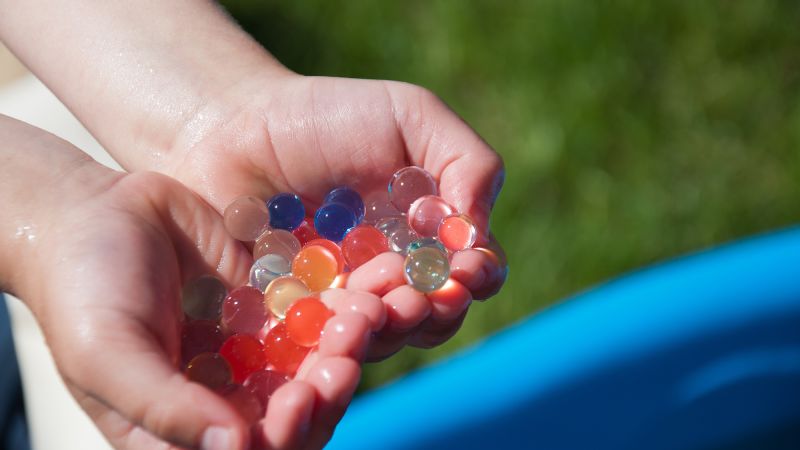Government officials, public health professionals and concerned parents are calling on Congress to ban water beads, a children’s toy that they say poses significant health risks.
In a news conference Monday, Congressman Frank Pallone Jr. of New Jersey announced that he will be introducing a bill at the House of Representatives this week aimed at instating a national ban on beads marketed to kids.
“They are specifically marketed to kids. In a single small package you can have 25, 50, or even 75 thousand of these beads and it just takes one to cause harm to a child,” said Pallone. “They are not labeled as dangerous to small children, there’s no warning, and they’re not hard to get.”
However, Pallone said that product warnings are not enough. “We have to ban them because there’s absolutely no way to ensure through any kind of education that they’re going to be safe or that that kids won’t handle them after they’ve fallen on the floor,” he added.
Water beads are tiny balls made out of extremely absorbent polymer material. When exposed to liquid, however, they can expand to 100 times their initial size and weight, according to the Consumer Product Safety Commission.
These beads are often sold as children’s toys to teach counting and motor skills, and are sold by popular retailers such as Target, Walmart and Amazon. CNN has reached out to these companies for comment.
“They’re being marketed as crafts, as a tactile toy for children with autism, even ammunition for toy guns,” CPSC Chairman Alex Hoehn-Saric said at the news conference. “It is far too easy for beads to be lost, dropped, and a short time later a baby or small child ends up finding them, picking them up and ingesting them.”
Because they can grow inside the body once ingested, these toys pose immense health risks to young children, say experts. In a safety alert in September, the CPSC reported that these beads “can cause severe discomfort, vomiting, dehydration, intestinal blockages and life-threatening injuries” and may require surgery to remove.
And, because they’re mostly made up of water, typical X-rays often do not pick them up.
“It’s hard to tell in an emergency room that a water bead is causing the problem,” Dr. Harpreet Pall, a pediatric gastroenterologist and Chair of Pediatrics at Hackensack Meridian Health K. Hovnanian Children’s Hospital, noted at the news conference.
Pall also emphasized that water beads have been responsible for 4,500 emergency room visits nationwide since 2017, and that these incidents have grown more frequent.
“Water beads are a nightmare for parents: they look harmless and fun, but they can be deadly,” William Wallace, associate director of safety policy for Consumer Reports, said in a statement. “Yet companies are marketing them as safe, leading parents to unknowingly put their children at risk. Consumer Reports is proud to endorse Congressman Pallone’s bill because parents already have enough on their plate to worry about, and they should be able to trust that toys they might buy for their children are actually safe.”
Pallone expects cross-aisle support for this bill in both the House and the Senate.
“We will try to get Republicans to co-sponsor the bill in the House and get Democrats and Republicans to introduce the bill in the Senate,” he said. “This is going to be bipartisan.”
The CPSC has announced several recalls of water bead kits from various manufacturers due to ingestion hazards. Most recently, the Commission and company Buffalo Games recalled about 52,000 Chuckle & Roar Ultimate Water Beads Activity Kits in September. Buffalo Games had received reports of one 10-month-old baby who died and another 9-month-old baby who needed surgery after swallowing the beads.
“Companies must step up and prioritize safety in their product design and the quality of their manufacture,” said Ashley Haugen, founder and president of That Water Bead Lady, a product injury non-profit and advocacy group. “We call on retailers to consider the best interests of their youngest consumers and remove water beads from shelves and online platforms.”
Haugen said that, in 2017, her infant daughter was poisoned by water beads that stayed in her system for more than 70 days, and needed major emergency surgery to save her life. “Accidents happen and in those moments the design and quality of a product can make a crucial difference between a minor mishap and a major tragedy,” she said.
Hoehn-Saric said that, beyond the Commission’s recalls, the CPSC is investigating taking further action regarding potentially harmful chemicals in water beads. “But this bill is so important because it is the fastest way to move forward and address the problem across the country for all parents,” he said.
Read the full article here








